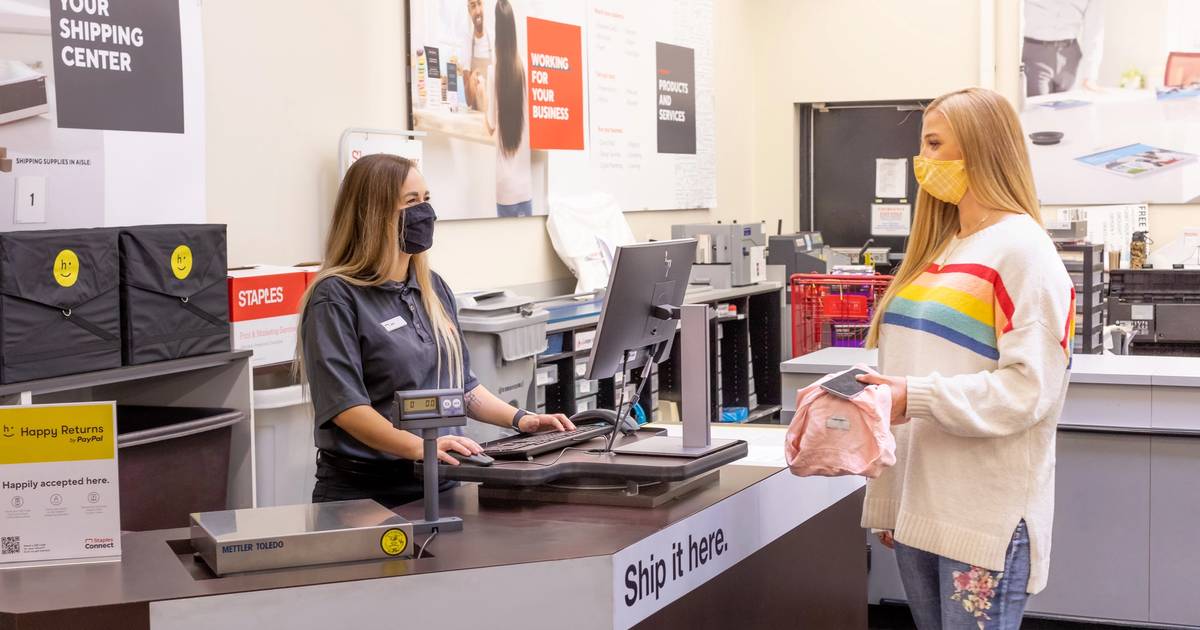Morning Brew, 4 MIN READ, Katishi Maake, Retail Writer
66% of US shoppers said they’re more likely to purchase an item online when it can be returned to a local store, according to Uberall.
Getting gifts for the holidays = a big W. Having gifts that don’t work = a big L. But thankfully, we have “returns” when we rack up those losses.
As we’ve been reporting this month, the holiday season is here. And the volume of e-commerce means an increase in returns, which is, naturally, a big sticking point for retailers. They don’t want consumers to have a difficult experience returning gifts, as that makes them less likely to shop there in the future.
Holiday sales are predicted to jump 7% to 9%, to $1.3 trillion from November to January, per Deloitte. Last year, American shoppers returned approximately $428 billion in merchandise, which accounted for 10.6% of total 2020 retail sales, according to NRF. Fortunately for retailers (and consumers), there’s a cottage industry popping up to help stores navigate the headache of returns.
Like Happy Returns, for example, a company that offers in-person returns for online purchases, which allows shoppers to bypass mailing items in (which, by the way, can come with some heavy shipping and carrier fees).
Customer satisfaction: E-commerce generates return rates that are three to four times higher than brick and mortar due to carrier costs and volume, which in turn increases costs for consumers and retailers, David Sobie, VP of the return logistics company Happy Returns, told Retail Brew. The company provides software for merchant websites, like Everlane and Steve Madden, which are connected to a drop-off network used to get return items back to the retailer.
Happy Returns makes it so retailers can reduce the headache that comes with returning items. The PayPal–owned company recently reached a new partnership with Staples to expand its return network to 1,000 additional locations.
Online shoppers at Happy Returns’ merchant partners can return items purchased online to any Staples store. Once an item for return is brought into a Happy Returns location—now up to 3,800, with their Staples partnership—a shopper can immediately receive a refund..
- According to a report by Uberall, a software solutions firm, 66% of US shoppers said they’re more likely to purchase an item online when it can be returned to a local store.
“If you’ve been following retail and know what’s happening with carriers increasing prices, that’s getting more and more expensive. Compounding the headache is the fact that shoppers expect returns to be free right now,” Sobie said.
Convenience rules
Because of the global supply-chain issues affecting literally everyone, retailers have to keep this chaos in mind, Sobie explained. As a result, the holiday shopping season has started earlier, which may affect how consumers shop and when they make returns.
Bright and early: For example, to lure early holiday shoppers, on October 10 Target instituted a price-matching pledge that runs through December 24. David Malka, chief sales officer at return logistics firm goTRG, told Retail Brew. GoTRG’s clients typically see a return rate of purchases around 30%, but that could jump to 40% given early shopping incentives.
Malka said the price-match pledge will make consumers feel more comfortable making purchases on a whim, and do so earlier in the season, with the guarantee they can return items if Target doesn’t end up dropping the price.
- “Retailers offering to price match is a smart move amid another holiday shopping season in turmoil,” he said. “It shows they are aware of how crucial it is to lock in holiday sales as early as possible, given challenges such as supply-chain delays and rising prices on goods.”
To minimize turmoil, online purchases from Saks OFF 5th placed between October 15 and December 25 are eligible for free returns through January 31. Macy’s is also extending its return timeframe.
“With more people shopping online than ever before, we want to ensure we deliver a seamless shopping experience, which includes the added convenience of free returns,” Shivi Shankaran, Saks Off 5th chief operating officer, told Retail Brew.
Exchange game: As Happy Returns grows its reverse logistics network, Sobie said the company wants to hone in on securing exchanges for retailers. Happy Returns asks customers why they are returning an item and based on the response will recommend an alternative. If a customer selects an exchange option, it’s shipped the moment an item is returned.
“It is pretty well documented that if a shopper has a bad return experience, they’re definitely very unlikely to shop with that merchant again. The cost of getting it wrong is really high, and the value of getting it right is very high,” Sobie told us.—KM







